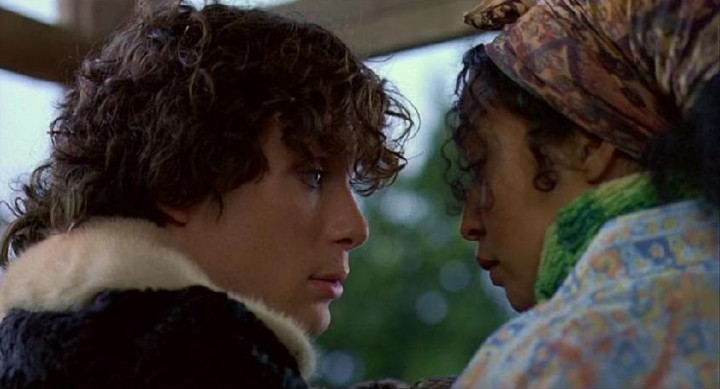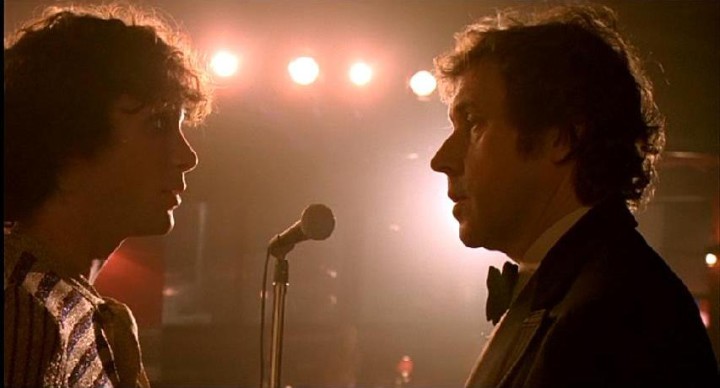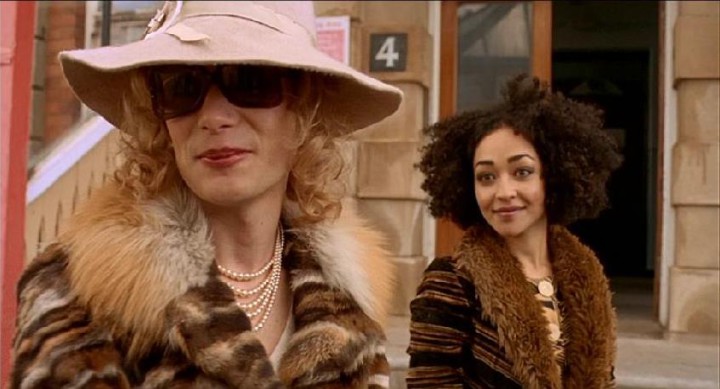One of the biggest delights and best surprises of the 2005 awards season was Neil Jordan’s Breakfast on Pluto. I caught a screening of it at 9 a.m. and liked it so much that I arranged to see it again as soon as possible (which was after the theater closed that night). In fact, I liked it enough that it was my pick for best film of that year—and it still is. Before the screening, I’d never heard of the film and I went in knowing absolutely nothing about it. When I saw that it was adapted from a novel by Patrick McCabe—whose book The Butcher Boy Jordan filmed in 1997 (both times with McCabe co-writing the screenplay)—I immediately expected a bitterly funny, but grimly disturbing movie was about to unfold. (I expected this even in spite of the bright pop colors and the Rubette’s “Sugar Baby Love” playing on the opening soundtrack.) And then there was Cillian Murphy as Patrick “Kitten” Braden parading along in full drag while pushing a baby in a pram and offering to take up a lewd workman and his friends on their propositions. When this reaction silences them, Kitten opines, “Not up to it then, you innocent, shovel-wielding, horny-handed sons of the native sod?” Then, leaning in to address his infant charge, he adds “Not many people are, munchkin—not many people can take the tale of Patrick Braden, aka St. Kitten, who strutted the catwalks, face lit by a halo of flashbulbs, as ‘Ooh!’, she shrieked, ‘I told you from my best side, darlings!’” Well, this intro—which indeed starts that very tale—indicated that this could be a different sort of film for Jordan. It is and it isn’t, of course. The stories in the film have much the same concerns as his other work, but the tone is different. Breakfast on Pluto is a film that anyone who’s ever been an outsider can relate to—and if you came to adulthood in the film’s setting of the late 1960s and early 1970s, so much the better.
Like a cinematic Roman candle, Neil Jordan’s Breakfast on Pluto bursts onto the screen ablaze with more color, more ideas, more nerve, more invention and more heart than just about anything imaginable — reminding us anew that Jordan is quite probably the finest filmmaker working today. He’s certainly the most stylish, but even more, he’s that rarest of the rare, in that style and theme are on equal footing. This marks Jordan’s second translation to the screen of a novel by Patrick McCabe. The Butcher Boy, from 1997, was the first (McCabe co-authored both screenplays). While on the surface,Pluto appears a much lighter work than the frequently grim and disturbing The Butcher Boy, Jordan’s new film is very much part of the same world. It’s just a different slice of it. Both films are firmly grounded in their respective eras, and both nail those eras in ways almost no one else has even approached. Moreover, both are the stories of outsiders in small Irish towns, and both outsiders find themselves in situations that ultimately rob them of most, if not all, of their tenuous support network of friends. The stories are very Irish, very Catholic, very specific … and yet strangely universal in that the overriding sense in both is the human desire to belong, and to love and be loved.
Breakfast on Pluto is a happier, more hopeful story, but one that is infused with a deep sadness and longing just at the edge of every frame, and in every nuance of Murphy’s performance. As with The Butcher Boy, the title is taken from a song — in this case a 1969 British pop song by one-hit-wonder Don Partridge (“We’ll visit the stars and journey to Mars, finding our breakfast on Pluto”). Though the song is referenced in the film, it only appears over the end credits. Yet pop culture — mostly in the form of songs — informs the entire film in a way that is barely suggested by the source novel. This not only results in an amazing soundtrack of late ’60s and early ’70s music, but is the sort of thing that feeds Patrick’s dreams and defines them — from the ideal of simple companionship (Harry Nilsson’s “Me and My Arrow”) to defiance (Nilsson’s “You’re Breaking My Heart”), sardonic self-image (Bobby Goldsboro’s “Honey”) and the wholly anthemic (T. Rex’s “Children of the Revolution”). And those in the audience who fall into the age range of Jordan and McCabe will recognize and respond to these things (remember how cool we felt in 1973 listening to a song — “You’re Breaking My Heart” — with a chorus that ended with, “so fuck you”?). Similarly, there’s an earlier, charming sequence where the 10-year-old Patrick (newcomer Coner McEvoy) absorbs lessons in sophistication from Patrick Macnee in an episode of The Avengers on TV (The Murder Market episode, for the encyclopedic among us); it was a basic introduction to coolness and savoir-faire for many of us of that generation. Patrick is purely a product of his time, and part of that time’s search for a deeper meaning to it all — a meaning that wasn’t effectively addressed by the traditional methods that then existed.
The film’s story is that of a search. On the surface, it’s Patrick’s search for the mother (Eva Birthistle, Bloody Sunday) who abandoned him on the steps of his real father’s parish. But really, the search — which takes us through a love affair with a traveling rock musician and IRA gun runner (Gavin Friday) to a stint as a “Womble” in a children’s amusement park to becoming the assistant to a romantically inclined magician (Jordan regular Stephen Rea) to being mistaken for an IRA bomber to prostitution and further — is Patrick’s search for himself. And whether he finds himself doesn’t actually matter all that much. It’s the attempt that counts — or, as a philosophical biker tells him early in the film, it’s the journey itself that matters. And what a glorious journey Patrick has been given by Jordan — one that’s at once funny and playful, that’s touched with greatness and is heartbreakingly sad. Most movies are successful if they do one thing well. Breakfast on Pluto does more than one thing — and not only well, but with a level of brilliance all too rarely encountered. Repeat viewings pay dividends each time (I’ve seen it seven or eight times myself), as they do with all great films.
The Asheville Film Society will screen Breakfast on Pluto Tuesday, Aug. 11, at 8 p.m. in Theater Six at The Carolina Asheville and will be hosted by Xpress movie critics Ken Hanke and Justin Souther.








Before you comment
The comments section is here to provide a platform for civil dialogue on the issues we face together as a local community. Xpress is committed to offering this platform for all voices, but when the tone of the discussion gets nasty or strays off topic, we believe many people choose not to participate. Xpress editors are determined to moderate comments to ensure a constructive interchange is maintained. All comments judged not to be in keeping with the spirit of civil discourse will be removed and repeat violators will be banned. See here for our terms of service. Thank you for being part of this effort to promote respectful discussion.